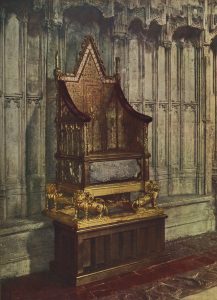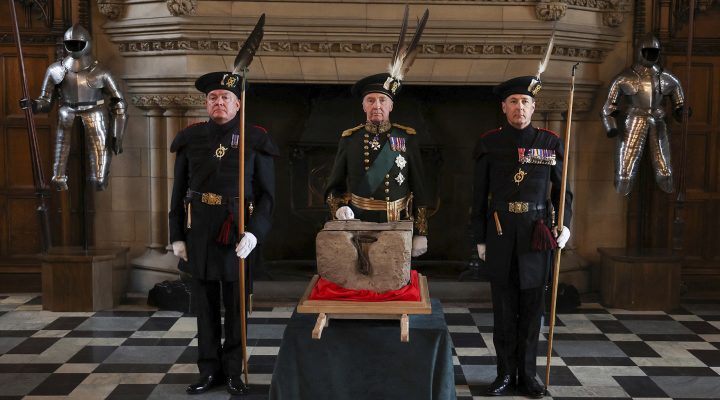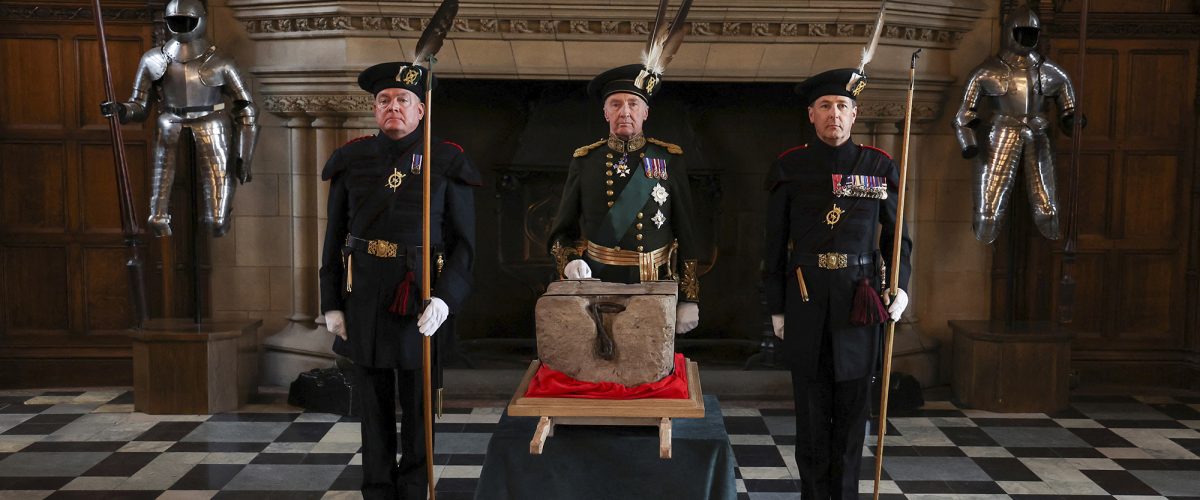If you blinked, you missed it. There amidst the glitz and glitter of the king’s coronation sat a 335-pound boulder.
You’d be forgiven for not noticing it. When compared to a jewel-encrusted crown, a silver sword and a golden orb, a block of Scottish sandstone doesn’t appear very valuable.
To many watching King Charles’ coronation, it probably looked like a bit of masonry propping up the 700-year-old throne above it. However, this particular slab of stone, referred to as the Stone of Scone (pronounced skoon) or the Stone of Destiny, is priceless to the people of Scotland.
Legend has it that the stone was the rock used as a pillow by Jacob in Genesis 28:10-17. Resting his head on the rock, the patriarch dreamed of a ladder full of angels reaching to heaven and heard the Lord promise him his descendants would be as numerous as the dust of the earth and as far flung. The next day Jacob set his stone pillow up as a memorial and anointed it to mark God’s presence in that place.
The legend says later one of Jacob’s sons carried the stone to Egypt. From Egypt the Stone of Destiny journeyed to Sicily, Spain and eventually on to Ireland, where it was placed atop the hill of Tara where the Irish crowned their kings.
The mythical Irish king Fergus the Great traveled across the Irish Sea to Scotland in the fifth century CE and brought the Stone of Destiny with him to his new kingdom. Three hundred years later his descendant King Kenneth McAlpin led a united nation of Picts and Scots against invaders from England. Victorious, he installed the Stone of Destiny at the Pict capital in Scone as a symbol of national authority and unity.
There, a monastic community of Columba’s followers took charge of the coronation stone. The Picts and the monks are long gone, but a replica of the Stone of Destiny stands in the approximate location of the original at Scone Palace near Perth.
Is any of this legend true?
As with any myth, there’s truth and then there’s Truth. Scientists who’ve studied the stone report its red sandstone is consistent with rock quarried from the Scone Sandstone Formation near Scone Palace. So, the Stone of Scone is from Scone, not from the Holy Land, and not Jacob’s pillow.
“While French and Anglo-Saxon monarchs looked to David and Solomon for their authority, the Scots went one better by reaching farther back in time and claiming a connection to Jacob.”
However, by connecting themselves to the Hebrew patriarch, the upstart Scots aligned themselves with the established church in Rome. While French and Anglo-Saxon monarchs looked to David and Solomon for their authority, the Scots went one better by reaching farther back in time and claiming a connection to Jacob.
There are also stories incorporating Celtic Christianity into the stone’s mythology, including St. Patrick’s blessing of Fergus in Ireland and Columba’s crowning of Aiden on Iona. McAlpin and his descendants emphasized the stone’s provenance as a means of holding the tribes of Scotland together against Viking and English invaders.
For centuries, the kings of Scotland sat upon the Stone of Scone during their coronations. Then, in 1296, King Edward I of England invaded Scotland and captured Scotland’s king, John Balliol.

The coronation chair, with the Stone of Scone, in Westminster Abbey, at the coronation of George VI, 1936. The seat that all sovereigns of England (excluding Mary I and II) have been crowned since Edward the Confessor. George VI (1895-1952). (Photo by Culture Club/Getty Images)
To add insult to injury, Edward I seized the Stone of Destiny, carried it back to England and ordered a special chair made to hold the stone that he might sit upon it as the self-proclaimed king of Scotland. English monarchs have used that coronation chair, now 700 years old, in every coronation since 1308, including that of Charles III.
Prime Minister John Major returned the Stone of Destiny to Scotland’s care in 1996 on the condition that officials transport it to Westminster for future coronations. Many in Scotland resent its recent return for the coronation of King Charles.
“It’s interesting how it’s even reported. They never say it was stolen by Edward. ‘It was removed, it was taken, it arrived in London,’” said Torcull Kennedy, a musician and folklorist who passed out pamphlets calling for Scottish independence the morning of the coronation. “It was there as a symbol of the subjugation of Scotland by England, and that’s why I object to it being there in the first place.”
Scotland regained its independence when Robert the Bruce defeated Edward II, and the country retained a separate ruling class until Queen Elizabeth I died and left her kingdom to James I, the son of her Scottish cousin, Mary.
A hundred years later, the Act of Union in 1707 merged the countries’ two parliaments. Scotland was the decidedly lesser member of the new “Great Britain” and remains so today, even after its parliament was re-established in 1998.
“In a way, Scotland has been treated like a colony, just as the colonies of the empire used to be treated,” Kennedy said. “In the 1970s was the discovery of oil in the North Sea. All the revenue for that went straight to London. We saw very little in the way of benefit. As an independent Scotland, we would be able to benefit from our own resources.”
Kennedy isn’t the only one pushing for an independent Scotland. While the early kings of Scotland drew followers together around a common Christian faith, rising secularism in Scotland is contributing to a new nationalism.
“I don’t think it’s a coincidence that we’re seeing the ties of that British state unraveling at the same time as the Protestant culture that defined it is receding on both sides of the border, with this much more secular and pluralist set of norms becoming dominant,” said Alec Ryrie, professor of Christian history at the University of Durham.
Jonathan Chaplin of the Cambridge Theological Federation agrees: “All four nations in the UK are in different ways struggling with living through post-establishment tensions.”
Despite the waning influence of the church, the Protestant Reformation’s still influences Scotland’s quest for independence.
Leslie Orr, at the University of Edinburgh’s Center for Theology and Public Issues, believes the Reformation “led to a more collective, possibly a more egalitarian, outlook or perspective that has shaped Scottish history since.”

Portrait of Henry VIII after Hans Holbein the Younger, c. 1537–1562. (Photo Wikipedia)
While the Reformation in England originated with King Henry VIII and established the king as head of the church, Scotland’s Reformation was heavily influenced by Calvinists across the channel and directly challenged the king’s authority during the English Civil War.
“The fact that the Scottish Reformation is bottom up and forced on a reluctant crown, … that deep suspicion of political authority, and willing(ness) to organize against it, is a thread that runs through Scottish political culture. It can be traced to that mulish awkwardness of Calvinism,” Ryrie said.
The idea of the common good and collective responsibility Orr believes are rooted in the Reformation and also shape the call for independence in Scotland.
“People south of the border misinterpret the nature of the debate and think they are primarily ones of nationalism and identity,” she explained. “This is not so much to do with nationalism; it’s to do with the question of values and principles that religious leaders and faith traditions want to uphold and have seen so undermined and challenged by the state of Westminster politics: austerity, asylum seekers, the question of poverty. There’s so many social justice issues I think are very important for faith communities.”
Kennedy sees this firsthand in Scotland. “We have a different kind of view of things in Scotland. We actually need immigration because we’re all getting older.”
George, who was handing out information with Torcull, chimed in, “Scotland wants immigration, England does not. It’s sad about the racism in so many places. Government stats illustrate (immigrants) coming on boats make a life here, add to the GDP of the country.”
Imam Sayed Razawi, director general of the Scottish Ahlul Bayt Society, finds the nationalism in Scotland is one of “freedom and emancipation.”
“There’s a unique nationalism in Scotland that is appealing to people of minority faiths,” he said.
Scottish nationalism is based on solidarity around the common good rather than culture and country of origin. “English nationalism treats minorities as the ‘other.’ Whereas in Scotland, where there is no ethnic divide (it is) similar to the United States where if you’re American, you’re American. I look at some of our colleagues, friends (and) relatives in London who are third generation, and they will always be looked at as the ‘other.’”
English nationalism, fueled by xenophobia and isolationism, is responsible for Brexit, the United Kingdom’s departure from the European Union. Having benefited economically from the EU partnership, Scotland voted overwhelmingly against the Brexit referendum. Roads were one of the “big benefits we got when we joined the EU,” Kennedy said. “You’re traveling on a renewed road because the EU gave the money. The British government didn’t.”
The Scottish National Party is in favor of Scottish independence and made rejoining the EU a plank of its campaign platform. In 2020, when Brexit took effect, polls showed the number of those in favor of independence for Scotland were at an all-time high. “Brexit has quite likely given the nationalist movement the extra push it needs to get over the edge,” said Ryrie, who sees a resurgence of European identity in Scotland as opposed to a strictly British one.
Holding a referendum on Scottish independence, however, isn’t solely up to the people of Scotland. According to the Supreme Court of the United Kingdom, both the British and the Scottish parliaments must agree, and for now UK Prime Minister Rishi Sunak is refusing to allow Scotland to hold a referendum.
The last such vote occurred in 2014, with most Scots identifying as Protestant voting to remain part of Great Britain. However, 57% of those who marked “no religion” on the 2011 census voted for independence in 2014, and it is this demographic that is steadily increasing while Protestantism is on the decline.
The Greens and Scottish National Party, who both campaigned on independence in 2021, together won 72 out of 129 parliamentary seats in that election. It was the third pro-independence majority in a row for the Scottish parliament.
“There are people who say the next election should be a referendum for Scottish voters. If it turned out the SNP swept the board, it would be hard to say there wasn’t a mandate. That’s what’s happened to every other country who’s become independent from the UK,” Kennedy said. “Even tiny Caribbean islands have become independent from the UK, and nobody’s saying you’re too small, you’re not clever enough. They’re allowed to be independent.”
 George explained it this way: “England is a small country and Scotland even smaller. Imagine Canadians next to a really wealthy neighbor. The United States (says), ‘Forget this independence, why not be ruled by Washington?’ Canada would look at you as if you were mad. Well, we’re similar.”
George explained it this way: “England is a small country and Scotland even smaller. Imagine Canadians next to a really wealthy neighbor. The United States (says), ‘Forget this independence, why not be ruled by Washington?’ Canada would look at you as if you were mad. Well, we’re similar.”
Orr said she would rather be a part of “a small responsible nation, one that is better to its citizens.” She believes “self-determination and Scottish independence is our best hope for developing into that nation with rights and equality.”
Recent polls show Scotland evenly divided on the question of independence.
The death of Queen Elizabeth, who was popular in Scotland for her visits to Balmoral, created a surge of pro-union sympathy. However, her son Charles III is not as well liked as the late queen. Protesters in Edinburgh booed when the Lord Lyon announced the new king’s ascendancy.
A young man named Calum who was there said: “It felt important to express dissent. They proclaimed the king and people in Edinburgh booed and it is now a matter of historical record, and that feels important.”
“People who have a Scottish nationalist mindset tend to be suspicious of anything that’s power or influence is rooted in London rather than Scotland,” said Martin Hodson, general director of the Baptist Union of Scotland. “The level of celebration generally in Scotland is different than England. There’s a different feel toward the monarch.”
When surveyed, 72% of Scots said they were not interested in the coronation and only 45% wanted to keep the monarchy compared with 58% throughout the rest of Britain.
Protesters gathered again in Edinburgh and elsewhere to promote independence for Scotland on the day of King Charles’ coronation. From his information booth in the Scottish borders, Torcull Kennedy mused about the Stone of Destiny’s role in the coronation.
“When the monks at Scone abbey knew that Edward and his army were coming to take away the Stone of Destiny, and they were charged with looking after it, are they going to hand it over to him, or are they going to say, ‘Here’s the Stone of Destiny’ which is actually an old cistern cover from a medieval toilet?” He continued, “If they want to think that it is (real), fine. As far as I’m concerned, it’s a fake and a switch was made.”
The United Kingdom rules Scotland for now, but English control may be just as illusory as the substituted stone in the coronation chair at Westminster.
Perhaps the true Stone of Destiny lies hidden somewhere in Scotland waiting for the future when the nation’s people are independent once more. As the Scottish nationalist poet Hugh MacDiarmid wrote: “For we ha’e faith in Scotland’s hidden poo’ers, The present’s theirs, but a’ the past and future’s oors.”
Editor’s note: Imam Sayed Razawi, Lesley Orr, Jonathan Chaplin and Alec Ryrie all participated in the discussion “How Religion in Scotland has Helped to Influence Nationalism” hosted by the Religion Media Centre in the United Kingdom and available for viewing here.


